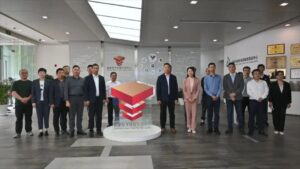Chengdu Daily Jinguan News Client Reporter Xu Can Editor Wang Jie
In today's China technology incubation field, Xie Jihua is a name that can not get around. As one of the country's top ten leaders in technology incubation, Xie Jihua to "look up to entrepreneurs" as the motto, engaged in technology incubation for more than 20 years. He is now President of the National Technology Transfer East Center and General Manager of Shanghai Yangpu Science and Technology Entrepreneurship Center. He founded the Upper Bay Valley Technology Park, initiated the Sino-American Corporate Innovation Center, and facilitated the Shanghai Zhangjiang Boston Enterprise Park. On the occasion of the 60th anniversary of Chengdu Daily, Xie Jihua will return to Chengdu, a city where, in his view, "dual-venture" is extremely active, to participate in the "He also took time out from his busy schedule to give an interview to us recently.
Right now, the development of China's incubators has fully blossomed, in further development, in the face of technology transfer and technology incubation internationalization proposition, where do Chinese incubators go from here? What are the sticking points for exploring and breaking through with the innovation card of using university research results? Facing the tide of "Double Creativity", how should the media find its position and make its voice heard? ...In a short half-hour interview, Shejewa shared with us his understanding and perspective.
Spotlight: Technology Incubation Internationalization
Clarifying the purpose and direction of internationalization Seeking cooperation to introduce advanced technology
"In the face of a new round of opening up to the outside world, the enterprise 'going out' strategy has also entered a new stage, when this time, the internationalization of our incubators must think about two things, one is the purpose of internationalization, and the second is the direction of internationalization." Watching China's incubators from scratch, from unilateral learning from overseas experience to multi-dimensional overseas layout set up locations, along the way, for China's incubators facing the new context, Shejihua always focus on these two key issues: learning advanced technology and technology, the introduction of quality personnel projects, is the purpose of internationalization; with China's existing advantages and overseas companies with advanced technology to start cooperation, improve the domestic The "gold content" of the real economy and science and technology, to help promote industrial transformation and upgrading, is the direction of internationalization.
In Xie Jihua's view, in the face of the obvious gap between technological innovation and the international advanced level, to do incubators in foreign countries, the introduction of overseas quality incubation projects, entrepreneurial team, through technology transfer network layout and mergers and acquisitions of overseas enterprises to achieve the introduction of advanced technology has become an urgent need.
"It's not that you're guarding at home and people will send you advanced technology." Referring to the current stage of the incubator's internationalization efforts, Xie Jihua believes that we are not waiting for a rabbit, but a great potential. "Although there is a 'short board' in our real economy with low technology content, we also have channels and ways to 'make up' for it, which will be based on China's own strengths." In Xie Jihua's analysis, sufficient capital, a huge market, the basis of industrial processing, these are the weights of our "going out" and seeking cooperation, and the direction of our cooperation is aimed at overseas advanced technology and enterprises with advanced technology, through cooperation and exchange to achieve our real economy to the high-end.
Focus: Transformation of scientific and technological achievements in universities
"Ice-breakers" are not a given. The need for a multi-party mechanism that works over time
"The transformation of university scientific and technological achievements into 'freezing' has been a long time, if the freezing of three feet, not a day's cold, then the 'icebreaker' action, naturally, is not a day's work." In Xie Jihua's view, the transformation of scientific and technological achievements of universities is a systematic project, involving all aspects of institutional mechanism construction, at present, although many cities, including Shanghai, Chengdu have a bold and decisive "icebreaker" action, but in the future, it is still a long way to go. As for the key to groping and breakthrough, Xie Jihua sorted out a few major sticking points of his long-term concern.
"The first issue is the responsibility of the school, how to achieve openness and fairness in the transformation of scientific and technological achievements of universities." In Xie Jihua's view, although the government has introduced many policies around the right to dispose of university scientific and technological achievements and the right to distribute income to support the transfer, but there is still a lack of an orderly institutional environment and open platform to put this into practice, and this requires a process.
At the same time, the solidification of people's ideas has also formed an invisible resistance to the transformation of scientific and technological achievements in universities, and there is an urgent need to change and renew the concept. "In particular, there are too many practical problems in the allocation process, which involves both avoiding the embarrassment of allocation ending up in a 'big pot of rice' and considering the balance between basic and applied scientific research, etc." According to Xie Jihua, to allay these concerns, not only policies but also schools need to carry out reforms based on the distribution area.
Then again, the follow-up of the transformation of school research results is also a difficult issue that needs to be properly addressed. "In the process of technological innovation, school scientific research results are often in the early stages, to really realize the industrialization of technology, but also need the team to further pay a huge amount of energy, which in turn is bound to conflict with the school's research and teaching." In Xie Jihua's thoughts, the transformation of university scientific and technological achievements has just "broken the ice", there are many joints to break through to perfection, and these are not overnight can be resolved, "breaking the ice" is not a watery thing, need to unremittingly explore and efforts.
Spotlight: Chengdu's "Dual-Track" Ecology
Chengdu's "Double Creativity" impresses people Highlighting determination in future innovation
Although he is based in Shanghai, Xie Jihua knows the entire innovation and entrepreneurship ecosystem in Chengdu. In his opinion, Chengdu's performance in two aspects of "Shuang Chuang" is impressive enough.
"Chengdu's own advantages in science and technology innovation are outstanding, with more gathered scientific and technological resources radiating throughout the southwest, and a concentration of university research institutes, etc., all of which have become the cornerstone of Chengdu's continuous enhancement of its independent innovation capacity." This can be said to be Xie Jihua's overall evaluation of Chengdu's innovation gene, and what impressed him even more is Chengdu's performance in the wave of "Double Innovation". "Chengdu is one of the first cities to 'emerge' from last year's 'Dual Innovation'. The atmosphere of innovation and entrepreneurship is rapidly growing in Chengdu, which makes me feel Chengdu's determination in future innovation. " Shejewa told reporters.
And when it comes to Chengdu, for Xie Jihua, he has to mention Chengdu Tianfu Xingu as a partner. "The boldness and ability of Chengdu's private incubators, represented by Tianfu Xingu, to 'go out' and 'bring in' is no less than that of Shanghai." Xie Jihua said that in many cities often some large international exchange activities, more government or state-owned parks to promote, and in Chengdu, not only the government is keen and active in this area, but also the private incubator represented by Tianfu Xingu is also very active in it. "The activity of such private incubators, which is rare in the country, itself stems from the bottom line and confidence in Chengdu's 'dual creation' ecosystem." In his opinion, there is a good atmosphere for "dual creation" in Chengdu, which is that Chengdu actively encourages and supports private incubators, the government and state-owned parks to promote the development of "dual creation" in Chengdu as a whole, and work together to create an innovation and entrepreneurship ecological environment.
Focus: The power of media in "double creation
Media is not a spectator but an integrator. Mainstream media should be responsible for creating the culture of "Double Creativity".
"Under the background of the era of 'Double Venture', the media is the creator of the atmosphere of 'Double Venture', the disseminator of information and should be the integrator." Xie Jihua said that the media should pay more attention to, support and promote innovation and entrepreneurship, but it is not enough for the media to be an outsider in the field of "dual innovation".
In his view, in today's world, the global economy is developing in the direction of sharing and integration based on information technology and the Internet, under such circumstances, every industry cannot be "immune", and the same goes for the media. At the same time, the media itself is also facing reform and innovation under the old and new iterations, traditional media need to be integrated with new media, new media need to be constantly updated and developed, while media reform and innovation, it is necessary to integrate more scientific and technological forces, the application of more technology and information means. "Under such a background, the media and the 'double creation' should be interactive, not only to pay attention to it and spread it, but also to find more opportunities for integration and use more technological means to achieve the change of the media itself," Xie Jihua said.
On the occasion of the 60th anniversary of Chengdu Daily, Xie Jihua also voiced his expectations for the newspaper. "Innovation and entrepreneurship are still popular in the whole society, but the creation of 'dual creation' culture still needs the efforts of many parties, especially the mainstream media to promote it." From Xie Jihua's point of view, there are some shortcomings in the creation of the culture of innovation and entrepreneurship, such as the lack of a fault-tolerant mechanism. "Innovation and entrepreneurship not only need the society to do the icing on the cake, but also need to send charcoal in the snow, after all, in the tide of entrepreneurship, failure is still the vast majority of people, and success is still the tip of the pyramid." Xie Jihua hopes that more mainstream media like Chengdu Daily will take up their media responsibility and lead the society to form a more inclusive atmosphere, paying more attention to the "base" of the struggling entrepreneurs, instead of focusing on the "absolute number" of successful entrepreneurs. ".





